Tribal Law & Government Center
Overview
Effectively representing Indian nations and tribes requires an understanding of the laws, history and policies that affect them.
The complexity of "Indian law" – and the lack of specific programs designed to educate graduates about the unique legal and cultural needs of Indian people – has created a situation in which lawyers representing Indian tribes place too great an emphasis on state law and federal law when dealing with Indian nations. As a result, these lawyers may unconsciously be contributing to the weakening of unique tribal legal and governance traditions by recommending the adoption of tribal laws and policies founded upon the Anglo-American legal and political traditions rather than the unique traditions of their tribal clients.
Through its activities, the Tribal Law & Government Center at KU Law aims to equip students and legal professionals who will represent Indian nations with the skills necessary to appreciate and strengthen the unique nature of Indigenous tribal legal systems.
Academic Programs
KU Law offers a core curriculum in tribal law courses, covering topics such as Federal Indian Law. Students can also enroll in the Tribal Lawyer Certificate program, a JD/MA in Indigenous Studies joint degree program, and the Tribal Judicial Support Clinic.
Tribal Law & Government Center Academic Programs
Visit the Tribal Law area of study guide to learn about core courses and related courses, student organizations and other opportunities to engage in service projects, social events and academic competitions.
KU Law offers a JD/MA in Indigenous Studies joint degree program. The program allows students to obtain both degrees in seven semesters, including summer school. It is of special interest to students who intend to become leaders and policymakers in Indigenous communities worldwide.
The University of Kansas was the third institution of higher learning in the United States to offer a joint degree program relating to Indigenous peoples.
The Tribal Lawyer Certificate program is designed to ensure that law students aspiring to a career representing Indian nations have the skills necessary to appreciate and strengthen the unique nature of Indigenous tribal legal systems.
The Tribal Judicial Support Clinic gives second- and third-year students the opportunity to assist tribal court systems through a variety of projects. Although the Tribal Law & Government Center gives priority to the research requests of regional tribes (Kansas and Oklahoma), clinical students have worked on projects for tribal courts throughout the nation.
KU Law Partnership with United Nations Institute for Training and Research
Students enrolled in the Tribal Judicial Support Clinic may have the opportunity to train diplomats on Indigenous issues and conflict resolution as part of a partnership between KU Law and the United Nations Institute for Training and Research. Read more about the partnership with UNITAR.
Tribal Law & Government Center News
Read about the latest news from the Tribal Law & Government Center at KU Law in the center’s annual newsletter. Find program updates, alumni notes, upcoming events and student accomplishments.

Tribal Law & Government Conference
The annual Tribal Law & Government Conference at KU Law highlights how work addressing the emerging and historical problems of Indigenous law and governance are critical to strengthening tribal sovereignty.

Past Tribal Law & Government Conferences
The Tribal Law & Government Conference devotes significant scholarly attention to the study of organic tribal law, modern tribal governments and the evolution of tribal common law. Conferences typically offer CLE credit for a fee.
Find past conferences themes, speakers and topics in the menu below.
Past Tribal Law Conferences
Strengthening Institutions for Tribes during Trump 2.0
Friday, November 14, 2025
American Indian law scholars and advocates gathered at the University of Kansas in November 2025 to discuss the “Strengthening Institutions for Tribes during Trump 2.0” during the 2025 Tribal Law & Government Conference.
Speakers included:
- Nikki Borschardt Campbell | National American Indian Court Judges Association | Executive Director
- Mark Carter | Native American Rights Fund | Staff Attorney
- Layatalati Hill | National American Indian Court Judges Association | Board of Directors
- Larry Innes | Olthuis, Kleer, Townshend LLP | Partner
- Charissa Miijessepe-Wilson | Bears Ears Inter-Tribal Coalition | Co-Director
- Mackie Moore | Haskell Indian Nations University | Interim President
- Darren Root | Prairie Band Potawatomi Nation | Tribal Attorney
Strategic Litigation Advancing Indigenous Rights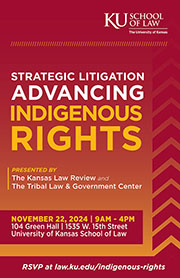
Friday, November 22, 2024
The Kansas Law Review and the Tribal Law & Government Center at KU Law hosted a joint symposium and tribal law conference at Green Hall in November 2024, featuring scholars from across the country who discussed contemporary developments in strategic litigation aimed to support indigenous rights.
Speakers included:
- Bethany Berger | Iowa Law School | Professor of Law
- Sarah Deer | University of Kansas | Distinguished Professor
- Layatalati Hill | Oneida Judiciary | Chief Trial Court Judge
- Laura Hines | University of Kansas School of Law | Centennial Teaching Professor; Director, Shook, Hardy & Bacon Center for Excellence in Advocacy
- Stacy Leeds | Sandra Day O’Connor College of Law, Arizona State University | Dean and Professor of Law
- Zach Pahmahmie | Prairie Band Potawatomi Nation | Vice Chair Person
- Rob Odawi Porter | Cornell Law School | Visiting Professor
- Alex Red Corn | University of Kansas | Associate Vice Chancellor, Office of Sovereign Partnerships and Indigenous Initiatives;
- Director and Associate Professor, Indigenous Studies Program
- Raymond Red Corn III | 𐓨𐓘𐓺𐓟𐓮𐓤𐓘𐓪𐓰𐓘𐓲𐓣 (Place to Borrow Money), A Community Development Financial Institution of the Osage Nation | Former Assistant Principal Chief of the Osage Nation
- Darren Root | Prairie Band Potawatomi Nation | Tribal Attorney
- Joseph "Zeke" Rupnick | Prairie Band Potawatomi Nation | Chair Person
- Whitney Sawney | Native American Agriculture Fund | Director of Communications and Policy
- Elizabeth Kronk Warner | S.J. Quinney College of Law at the University of Utah | Dean and Professor of Law
23rd Annual Tribal Law & Government Conference
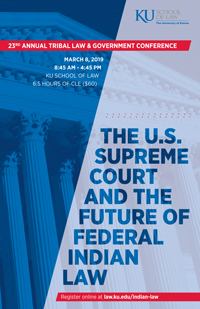
The U.S. Supreme Court and the Future of Federal Indian Law
Friday, March 8, 2019
American Indian law scholars and advocates gathered at the University of Kansas in March 2019 to discuss the “U.S. Supreme Court and the Future of Federal Indian Law” during the 23rd annual Tribal Law & Government Conference.
Speakers and topics included:
- Keynote speaker: Ian Gershengorn, Chair of the Appellate and Supreme Court Practice Group at Jenner and Block
- Ethan Jones, Yakama Nation – “Washington State Department of Licensing v. Cougar Den, Inc.: Taxation in Indian Country”
- Joel Williams, Native American Rights Fund – “Washington State Department of Licensing v. Cougar Den, Inc.: Taxation in Indian Country”
- Elizabeth Kronk Warner, Professor and Associate Dean, Academic Affairs, University of Kansas School of Law; Director, KU Tribal Law & Government Center; Affiliated Professor, Indigenous Studies – “Ethical Issues Arising in Indian Country”
- Professor Bethany Berger, University of Connecticut School of Law – "The Future of Indian Reservations following Carpenter v. Murphy"
- Professor Colette Routel, Mitchell Hamline School of Law – "The Future of Indian Reservations following Carpenter v. Murphy"
- Professor Monte Mills, Alexander Blewett III School of Law at the University of Montana – "The Scope of Tribal Treaty Rights following Herrera v. Wyoming"
- Professor Colette Routel, Mitchell Hamline School of Law – "The Scope of Tribal Treaty Rights following Herrera v. Wyoming"
22nd Annual Tribal Law & Government Conference
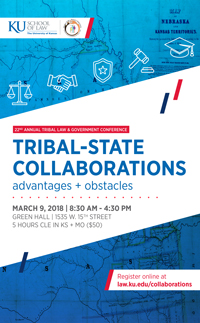
Tribal-State Collaborations: Advantages and Obstacles
Friday, March 9, 2018
American Indian law scholars and advocates gathered at the University of Kansas in March 2018 to discuss the “Tribal-State Collaborations: Advantages & Obstacles” during the 22nd annual Tribal Law & Government Conference. Judge William Thorne, the first Native American appointed to the Utah judiciary, delivered the keynote address.
Speakers and topics included:
- Keynote speaker: Judge William Thorne
- Hon. Mike Petoskey, Chief Judge, Pokagon Band – “Collaborations between State and Tribal Courts”
- Hon. Korey Wahwassuck, Judge, Ninth Judicial District, Minnesota – “Collaborations between State and Tribal Courts”
- Sarah Deer, Professor, International & Interdisciplinary Studies - Women, Gender & Sexuality Studies, School of Public Affairs & Administration, University of Kansas – “Tribal/State Collaborations Related to Law Enforcement, ICWA, and Cultural Preservation”
- Victoria Sweet, Program Attorney, National Council of Juvenile and Family Court Judges – “Tribal/State Collaborations Related to Law Enforcement, ICWA, and Cultural Preservation”
- Tonya Kowalski, Professor, Washburn Law School – “Tribal/State Collaborations Related to Law Enforcement, ICWA, and Cultural Preservation”
- Heather Whiteman Runs Him, Staff Attorney, Native American Rights Fund – “Maintaining Tribal Confidences”
21st Annual Tribal Law & Government Conference
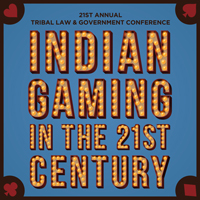
Indian Gaming in the 21st Century
Friday, March 10, 2017
The 2017 Tribal Law & Government Conference at the University of Kansas School of Law discussed the legal issues surrounding Indian gaming throughout the United States and in Kansas. The event also provided a brief introduction to the Indian Gaming Regulatory Act (IGRA).
Speakers and topics included:
- Keynote speaker: Chairman Jonodev Chaudhuri, National Indian Gaming Commission
- Richard Frias, Partner, Frias Indian Law and Policy – “Hot Topics in Indian Gaming”
- Steven Light, Associate Vice President for Academic Affairs and Co-Director, Institute for the Study of Tribal Gaming Law and Policy, University of North Dakota – “Hot Topics in Indian Gaming”
- Yonne Tiger, Attorney at Law – “Hot Topics in Indian Gaming”
- Russ Brien, Brien Law LLC – “Hot Topics in Indian Gaming (Kansas)”
- Mark Dodd, Executive Director, Kansas State Gaming Agency – “Hot Topics in Indian Gaming (Kansas)”
- Kaighn Smith Jr., Drummond Woodson, Attorneys at Law – “Ethical 'Obligations' and Affirmative Tribal Sovereignty”
20th Annual Tribal Law & Government Conference
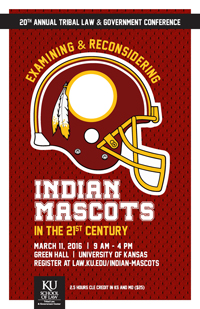
Examining and Reconsidering Indian Mascots in the 21st Century
Friday, March 11, 2016
The 2016 Tribal Law & Government Conference at the University of Kansas School of Law discussed the legal issues surrounding the use of images of American Indians as sports mascots. The conference was co-sponsored by the KU Tribal Law & Government Center and KU Student Senate.
Speakers and topics included:
- Keynote speaker: Suzan Shown Harjo, President, Morning Star Institute
- Cornel Pewewardy, Professor & Director of Indigenous Nations Studies, Portland State University – “Considering Mascots from a Native Perspective”
- Rebecca Tsosie, Regents’ Professor, Sandra Day O’Connor College of Law and Vice Provost for Inclusion and Community Engagement at Arizona State University – “Considering Mascots from a Native Perspective”
- Dan Wildcat, Director of the Haskell Environmental Research Studies Center and Dean of the College of Natural and Social Sciences at Haskell Indian Nations University – “Considering Mascots from a Native Perspective”
- Marc Edelman, Professor Law and Sports Business Scholar, Zicklin School of Business, Baruch College CUNY – “Intellectual Property and Sports Law Perspectives on Native Mascots”
- Jasmine Abdel-Kahlik, Associate Professor of Law, University of Missouri-Kansas City School of Law – “Intellectual Property and Sports Law Perspectives on Native Mascots”
- D. Michael McBride III, Director, Crowe & Dunlevy – “Ethical Considerations when Representing Tribal Nations”
Questions?
Shawn Watts
Lecturer of Law
Director, Tribal Judicial Support Clinic
shawn.watts@ku.edu
785-864-4513